Tag Archive: core vocabulary
September 8, 2013
by Carole Zangari -
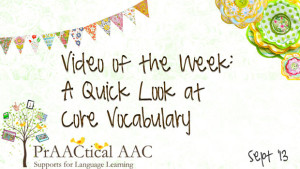
Need a video to introduce families and colleagues to core language? Check out this one from Carla Butorac from Behavior Communicates.
Filed under: Video of the Week
Tagged With: Carla Butorac, core language, core vocabulary
August 31, 2013
by Robin Parker -
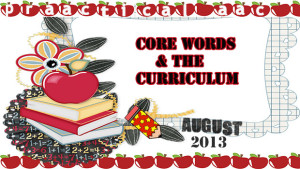
Core words can easily be incorporated into academic curriculum. There just needs to be systematic planning for core word vocabulary and then of course the joining of fringe words. One of the best visual explanations of core words is in the now ‘famous’ you tube video Language Stealers (HD). If you have not seen it, it is worth watching for many reasons but in the context of this post, it perfectly illustrates how you can teach about Greek and Roman history with core words. Planning for Core Words for the Classroom (& ALL School Activities) Have the core word communication board with you at ALL times– If you (SLP/Educator) have your core word communication board, you can model and teach the target core words during all lessons. A premise of this approach is that the student has access to their core word vocabulary display on a no-tech communication board or on their... [Read More...]
Filed under: Strategy of the Month
Tagged With: core vocabulary, curriculum
July 23, 2013
by Robin Parker -
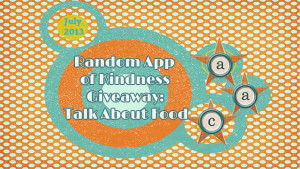
It’s a summer prAACtical Random App of Kindness giveaway! Thanks to the generosity of Hump Software (& Celeste Helling), we have 3 codes for Talk About Food. Talk about Food has been developed to target vocabulary building and communication skills. It has been designed specifically for children with low vision as well as those who are having difficulty with language development, or just starting to learn and use words through AAC. Pictures of food and food categories are high contrast to spark interest and visual attention. Then, the focus is talking about food (hence the app name). The communication emphasis is on core word vocabulary (Yay!) and building sentences. There are many great features & access settings and you can easily hide and show vocabulary for customization. The Giveaway starts now and ends on Saturday July 27th at 11:59 pm. We will select 3 winners for the Talk About Food App.... [Read More...]
Filed under: PrAACtical Thinking
Tagged With: core vocabulary, Giveaway, hump software, talk about food
July 4, 2013
by Robin Parker -
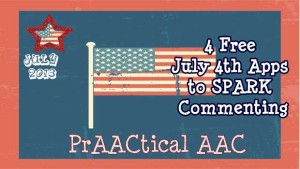
Check out these 4 free apps that can help SPARK commenting. They are great fun that will inspire commenting but can also help with core (and fringe) vocabulary as well as with being familiar with July 4th festivities. By engaging with these apps in an interactive manner, there is not the noise and confusion of the day. The apps become a good tool for familiarizing and preparing the learner for July 4th. Celebrate 4th of July, Independence Day of the United States , with sparkling fireworks (by Auryn Apps) Free – Just shake or touch the iPad and beautiful fireworks get triggered. The are really beautiful which are opportunities to comment again and again (“wow”, “beautiful”, “so cool”, “look colors”, etc.). Each firework reveals images that relate to Independence Day. This app is a gift from Auryn Apps which is a generous and dedicated developer for July 4th and throughout the year.... [Read More...]
Filed under: PrAACtical Thinking
Tagged With: Apps, commenting, core vocabulary, fringe vocabulary, July 4th
June 28, 2013
by Carole Zangari -
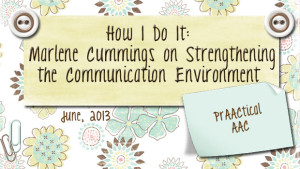
Marlene Cummings is back to share some thoughts on creating communication-friendly environments. As an AAC consultant to the Oakland Schools, Marlene gets to support AAC implementation in a variety of classrooms with all types of learners. You can read her earlier posts here and here. ::::::::::::::::::::::::::::::::::::::::::::::::::::::::::::::::::::::::::::::::::::::::::::::::::::::::::::::::::::::::::::::::::::::::::::::::::::::::: 5 Things to Consider in the “Communication Environment” The first thing we want to ask: Is language being represented visibly? We in AAC are often known by our “stuff”. Because we need to represent language visibly and love technology, we typically have a lot of “stuff”. I, for one, currently have a large storage unit holding 30+ years of “stuff” waiting to be distributed to all my new teams since I am no longer in the classroom. Let’s start by looking around our instructional environment. It is our intention to model the use of language being represented visibly and to provide the vocabulary and opportunities for... [Read More...]
Filed under: PrAACtical Thinking
Tagged With: 24/7, access, aided languagge input, classroom, core vocabulary, education, Marlene Cummings, modeling, opportunity
June 4, 2013
by Carole Zangari -
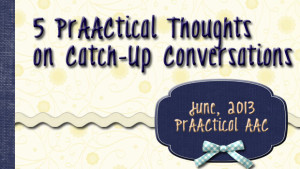
One of the things SLPs frequently do at the start of their therapy sessions is have some casual conversations with their clients to catch up on what happened since their last visit. Whether it is an elementary school student with ASD, a teenager with cerebral palsy, or an older adult with aphasia, we engage in polite conversation to find out what they’ve been up to and perhaps share a bit about our own experiences. Here are some thoughts on making those ‘catch-up conversations’ work from a prAACtical perspective. 1. Possible goal areas: initiate conversation; maintain dialogue on an established topic; redirect conversation to a new topic; respond to non-obligatory communication opportunities; use temporal terms in multi-word utterances; convey a personal narrative with a clear beginning, middle, and end; use regular past tense verbs; ask partner-focused questions 2. Core language targets: it, we, they, do/did, have/had, was/were, not It was (not);... [Read More...]
Filed under: PrAACtical Thinking
Tagged With: core vocabulary, fringe vocabulary, language goals, pragmatics, prompting, session planning
May 25, 2013
by Robin Parker -
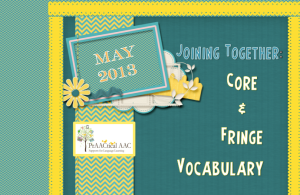
Last month we talked about Core Words, and we shared core word samples, philosophies, and resources. As we have moved into May’s Strategy of the Month, Communication Boards, we now want to share ideas about joining core and fringe words together on communication boards. Core vocabulary are those words used with high frequency and make up about 75-80% of the words we use everyday. Core vocabulary should be a main part of all AAC systems because it allows for most flexibility across most situations. With an emphasis on core words, we also use Fringe Vocabulary 20-25% of the time. Fringe vocabulary are used in a continuum of low-frequency to lower frequency situations (e.g., ‘mountain’: ‘glacier’, ‘crevasse’). Personal vocabulary can also be included under fringe vocabulary and would relate to personal words someone might need for their individual needs, interests, work, school, or even community. So, in the best communication world, AAC users would have access... [Read More...]
Filed under: Strategy of the Month
Tagged With: communication boards, core vocabulary, fringe vocabulary
May 2, 2013
by Carole Zangari -
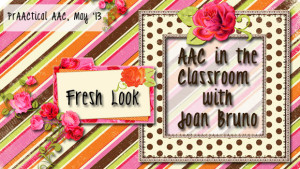
We’re off to a great start for Better Hearing and Speech Month! Today’s Fresh Look post comes from one of the most experienced AAC SLPs in the United States. Joan Bruno, Ph.D., CCC-SLP has over 30 years experience working in the field of AAC. She is currently maintains a private practice consulting to schools and private agencies and is the Augmentative Communication Specialist at the TECHConnection in Shrewsbury, NJ. Joan has published and presented nationally and internationally on a variety of topics related to AAC assessment and intervention. Joan is the 2011-2013 President of the New Jersey Speech and Hearing Association, and a Past-President of the United States Society for Augmentative and Alternative Communication. Since 1992, she has directed Camp Chatterbox, a therapy camp for children using AAC devices. Joan is the author of the Gateway to Language and Learning© page set and the Test of Aided-Communication Symbol Performance© (TASP). In... [Read More...]
Filed under: PrAACtical Thinking
Tagged With: core vocabulary, curriculum, Fresh Look, general education, inclusion, Joan Bruno, Language Arts, schools, word prediction
April 29, 2013
by Carole Zangari -
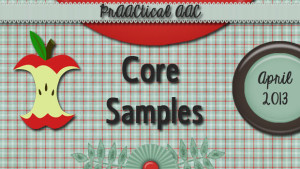
Whether we’re working on a project, cooking with new ingredients, or doing something crafty, one of the things we find most helpful is examples. Seeing how other people have approached a situation can be informative and inspiring. Making communication displays for people who use AAC is no different. Most of us appreciate the opportunity to see what our colleagues have done. We provided a number of examples of communication boards and books that are rich in core language in some of our earlier posts. Here are some of them, just in case you missed those posts. Kate Ahern’s Core Vocabulary in 3 Symbol Types (and Core Word Learning Book) via SlideShare Core language board with 20 PCS and 12 PCS by Yvonne Green via SET-BC PCS communication book (core and fringe) from the AT4All Wiki/Barbara Cannon PCS communication book pages in Boardmaker and PDF format by Polk County Public Schools... [Read More...]
Filed under: PrAACtical Thinking
Tagged With: communication boards, core vocabulary, examples, free download, resources
April 27, 2013
by Robin Parker -
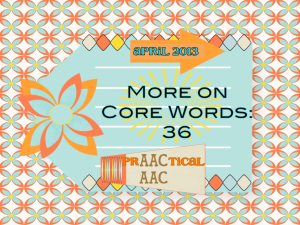
This month we have talked about core words and teaching strategies & considerations for facilitating USING core language. We have talked about aided language input, creating frequent opportunities, making connections b/w symbols and their referents, and motor planning/automaticity. As April ‘goes out’, we add graduated prompting/prompt hierarchies, and wait & signal/time delay prompts. The key to teaching AAC core word language is strategies…. Aided language input (ALI) is fairly simple to do but sometimes overlooked. However, once it becomes habit, it is hard not to do even when you are ‘just’ talking about AAC displays. There are many clinical rationales or reasons why ALI is so important. It provides a model of the language we expect from the child (or adult), and how would anyone speak a language if they never ‘heard’ it. ALI also helps by introducing new words and symbols in meaningful contexts. If we are speaking AAC throughout the day then... [Read More...]
Filed under: Strategy of the Month
Tagged With: core vocabulary, meaningful language experiences









